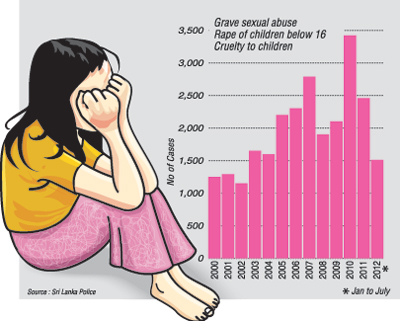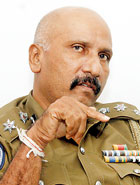News
Redress for abused children coming slowly but surely: Additional Solicitor General
Slowly but surely the wheels of legal bureaucracy are turning to bring quick redress to child victims and mete out justice to perpetrators of violent crime against them.
A pilot project is underway in Gampaha, Anuradhapura, Polonnaruwa, Batticaloa and Jaffna Districts to clear cases involving crimes against children within six months of the first complaint being made, Additional Solicitor-General and President’s Counsel Jayantha Jayasuriya told the Sunday Times.

The project implemented in October last year (2011) will be extended to Hambantota and Ratnapura Districts this year, he said.The project sets time-frames, the Sunday Times learns, and is being handled by the Children’s Unit (CH Unit) of the Attorney General’s (AG’s) Department, manned by five superior officers and 12 attorneys.
‘Child abuse’ covers three categories, according to Mr. Jayasuriya. They are ‘Grave sexual abuse’, ‘Rape of children below 16 years’ and ‘Cruelty to children’.
Conceding that there has been a jump in the incidents in recent times, he said it may be that people in the North and East are now free to report such crimes, while another may be that a large number are related to love affairs. Such affairs could lead to parents complaining to police.
However, this doesn’t mean that violent crimes are not being perpetrated on children by people who are family or those supposed to protect them as well as strangers, he pointed out.
With regard to love affairs involving minors, he said that the AG’s Department instructs the police to verify the status even though there has been an initial complaint. “Sometimes these children are living together, having got the blessings of their parents later. Then the department requests termination of the proceedings and discharge of the accused after informing court of the situation,” he said.
Referring to the procedure involving child abuse cases, Mr. Jayasuriya said that usually there is a lapse of about three to five years before the perpetrator is indicted and the case is taken up for trial. If the incident involved a 12-year-old, by the time she gives evidence she may be around 18 years.
This is seen as “secondary victimisation” of the child, Mr. Jayasuriya said. It is current Attorney General Palitha Fernando when he was Solicitor General who made a commitment last year to quicken the process, the Sunday Times understands.
The Justice Ministry, the AG’s Department, the Police Department and the Judicial Medical Officers (JMOs) through the Health Ministry then decided on the pilot project, with the loop being completed with the National Child Protection Authority (NCPA) and the Probation and Child Care authorities coming in to see to the safety of the child victims, it is learnt.
UNICEF volunteered to assist the project, Mr. Jayasuriya said.Under this project, within 24 hours of a complaint being lodged with the police, a report has to be faxed not only to the Deputy Solicitor General in charge of that area but also to the relevant Assistant Superintendent of Police.
The police will conduct investigations while the JMO will attend to the forensic examination of the child and submit his report in three weeks. By the fourth week, the police are expected to collect a dossier including the JMO’s report and the child’s birth certificate vital for verification of age. The Information Book (IB) extract is then submitted to the AG’s Department which will study the dossier and prepare the indictment.
If the police can’t keep to the deadline, valid reasons have to be given, Mr. Jayasuriya said.Steps are to be taken to sensitise judges of the High Court where these cases are taken up to conclude the evidence of the child within three months as far as possible, it is understood.
Meanwhile, with the clamour for the death penalty to be implemented against those committing violent crimes on children, many rights activists are of the view that the laws in place are adequate.The “deterrent”, however, should be three pronged, the activists said, detailing them as “promptness, predictability and severity”.
People should know that the law will come down promptly on perpetrators, an activist said, pointing out that currently, most rapists know that the long arm of the law takes a long time to reach them or never does. The other important prong is “predictability”, the Sunday Times learns. There should be the understanding in no uncertain terms that punishment will come to all perpetrators, whether rich or poor, powerful or not.
Now the belief is that powerful people, whatever crime they commit, will go scot-free, the activist said.
“Severity” is the third, the activist said. “Although the law provides for a maximum sentence of 20 years’ rigorous imprisonment for crimes against children, sometimes lighter sentences are handed out. This may be giving a wrong message to the perpetrators.”
Is the data correct?
Many questions arise with regard to child abuse data — is there a sharp rise in the number of children (those under 18 years of age) who are being abused or raped; is it due to better reporting; are all of them violent incidents; or is there a hidden factor? Violence against children needs to be dealt with immediately with the full force of the law, whether the culprit is highly-connected or not, the Sunday Times learns, but the figures also hide a secret that needs to be dealt with at a social level, that too as soon as possible.
“The horrendous rapes are happening, but there is also the issue of those below 16 years running away with 18-22 year olds by choice. The parents go to the police with the complaint that the child is “missing”. The police follow up this “first complaint” and these statistics go on record, the source pointed out.
Under the Penal Code, whether consensual or not, sex with any child under-16 is statutory rape. In other countries, the Sunday Times learns, the laws dealing with statutory rape and this other group are distinct.
There is an offence lesser than rape called “sexual intercourse with young girls” if it involves those in the age-group 12-14, the source said, adding that the punishment is also less stringent. There is no punishment, meanwhile, for consensual sex with girls over 14.
With regard to children under 12, sexual relations with or without their consent, is statutory rape, it is learnt.
The ground reality in Sri Lanka, the source explained, is that with the advent of quick and easy communication such as mobile phones, life even in the rural areas is not what it was. Children as young as 14, 15 or 16 run away, especially in areas where there are chena cultivations, he said, adding that figures, boosted by this factor, indicate a high-prevalence of rape. These are adolescent-sexuality related issues and need to be dealt with at a social level.
Taking into account our culture, what is needed is not a change in the law but to make children aware of the consequences of such actions. The correct perspective is essential along with concerted interventions such as awareness among children and in-depth lessons on reproductive health, was the consensus.
comments powered by Disqus






















